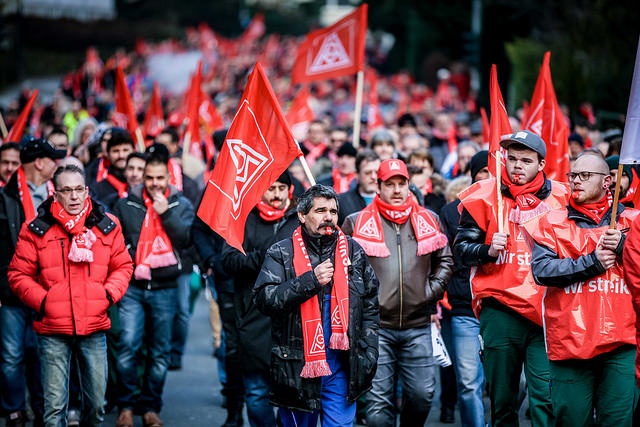11 January, 2018IG Metall commences mass strikes ahead of bargaining round with employers’ federation Gesamtmetall.
The industrial action started on Monday 8 January with a round of warning strikes – short actions where workers down tools for a number of hours, and take to the streets to demonstrate. About 160,000 workers took action at more than 80 companies, including Volkswagen, Porsche, Mercedes Benz, Daimler, Siemens, thyssenkrupp, Thales, Airbus, Honeywell, Bombardier and Atos.
If no progress is made in negotiations, the union intends to extend the action to full day strikes targeting key companies. The first round of bargaining for a collective agreement for the 3.9 million workers in the metal and electronics sector begins today, when the union meets the regional employers’ association in the state of Baden-Wuerttemberg, where a number of auto manufacturers are based.
The union is seeking a fundamentally new settlement for Germany’s industrial workforce, that will allow workers to benefit from rising productivity and achieve a better work-life balance. At a time of a booming economy and record low unemployment, the union is calling for a 6 per cent wage increase.
Another key demand is the right to reduce working hours to 28 per week to care for children or ageing parents, with the right to return to full time employment after two years. The union is also campaigning for an additional €200 carers allowance. The union believes that gender roles are changing, and that the reduced hours would allow more women to enter the workforce, and more men to take on caring responsibilities.
In the past, it has been companies that have demanded flexibility from their employees. The union wants to turn this around so that flexible work benefits workers and allows them to choose a work pattern that fits their family life.
Speaking to 2,000 workers at a rally in Homburg in Saarland in the south west, IG Metall president Jörg Hoffman – who is also IndustriALL Global Union president – said:
“With IG Metall, there will only be a collective bargaining agreement with all three components: a decent increase in pay, a choice to reduce working hours for a limited period of time, and grants that make working time reduction for parenting, nursing and health possible for everyone.”
IndustriALL assistant general secretary Kemal Özkan said:
“The German economy is doing well, and it is fair that workers should also benefit from productivity gains and have the right to flexibility.
“What is really historic is the demand to reduce working hours to 28 per week. It is important that workers benefit from the changes that Industry 4.0 brings to the world of work. This demand by IG Metall shows unions leading the way in building an economy that works for everyone.”
With 2.3 million members, IG Metall is one of the largest and most powerful unions in the world. The collective agreement that the union is negotiating would cover 3.9 million workers.





